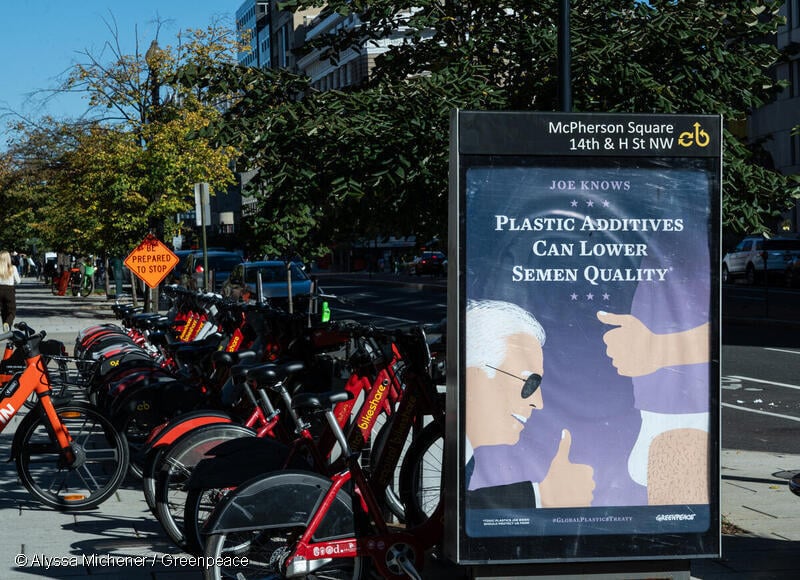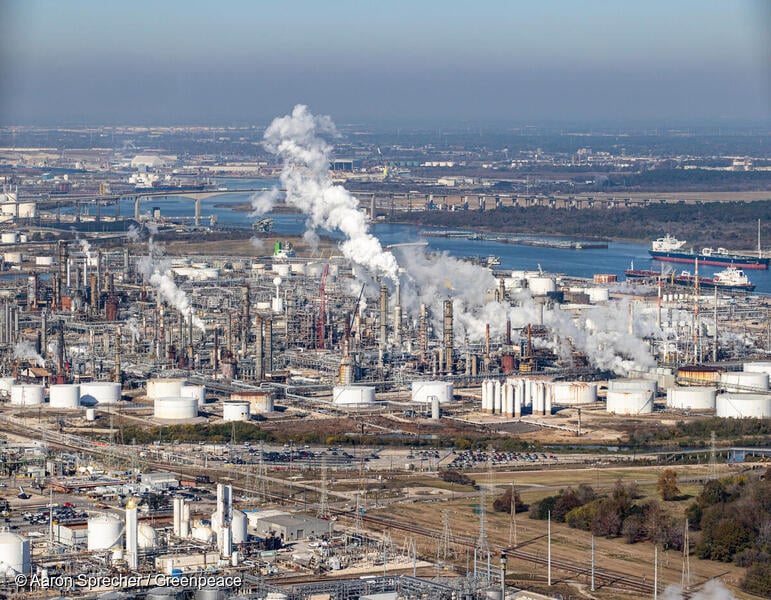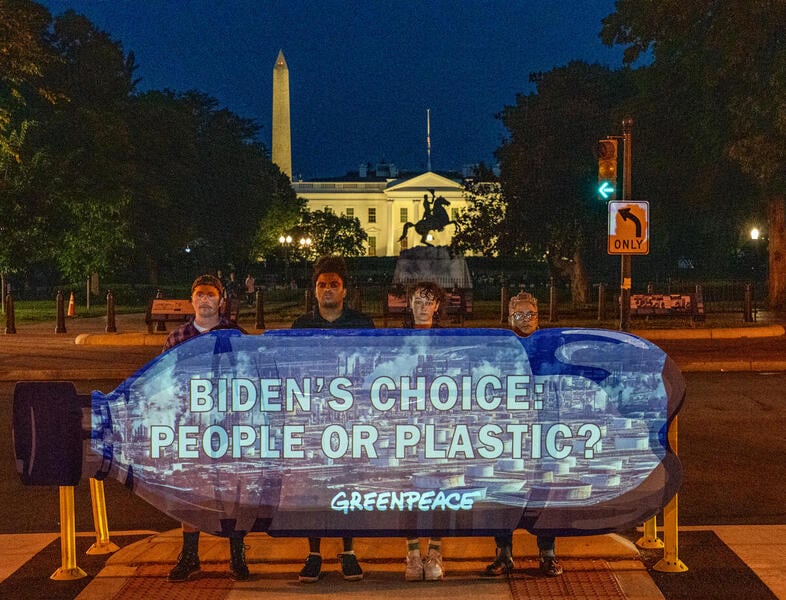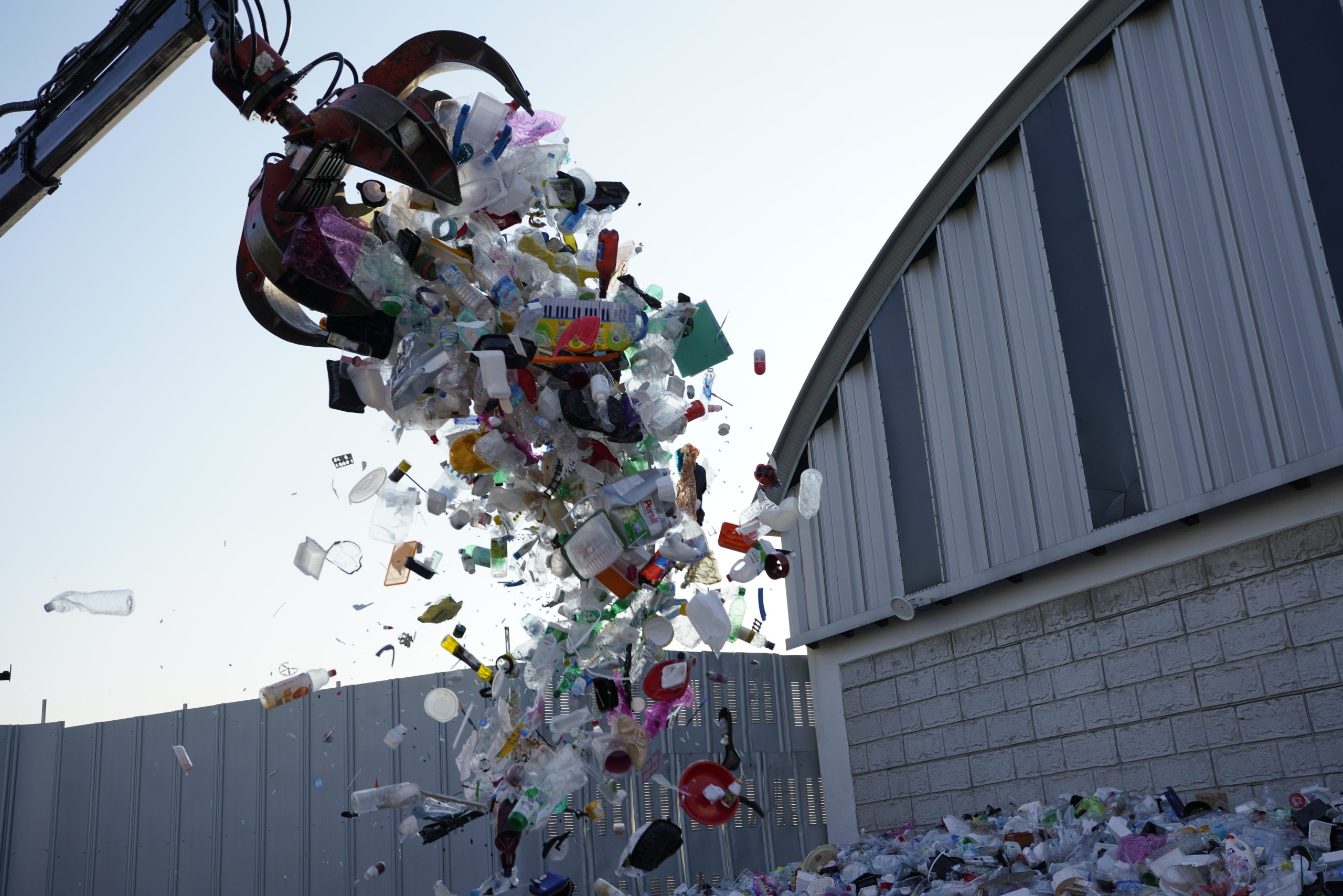Today, Greenpeace USA took over the streets of Washington, D.C., with a guerilla advertising campaign highlighting the harmful effects of plastic toxicity on human health. The campaign includes a satirical image of President Biden along with constituents impacted by toxic plastic.
The creative initiative aims to raise awareness and urge the Biden Administration to take action by supporting a strong Global Plastics Treaty. This treaty should reduce plastic production, protect human health, safeguard biodiversity, and provide a just transition for workers and frontline communities. The next round of negotiations for the Global Plastics Treaty will begin on November 12, 2023.

A guerilla advertising campaign takes over the streets and metro in Washington, DC to highlight the negative impact that plastics can have on human health. Greenpeace USA is calling on the Biden administration to support a strong Global Plastics Treaty that protects human health and cuts plastic production.
Poster in this image has the text “Chemicals in plastics can cause early puberty”.
Today, Greenpeace USA took over the streets of Washington, D.C., with a guerilla advertising campaign highlighting the harmful effects of plastic toxicity on human health. The campaign includes a satirical image of President Biden along with constituents impacted by toxic plastic.
The creative initiative aims to raise awareness and urge the Biden Administration to take action by supporting a strong Global Plastics Treaty. This treaty should reduce plastic production, protect human health, safeguard biodiversity, and provide a just transition for workers and frontline communities. The next round of negotiations for the Global Plastics Treaty will begin on November 12, 2023.

A guerilla advertising campaign takes over the streets and metro in Washington, DC, to highlight the negative impact that plastics can have on human health. Greenpeace USA is calling on the Biden administration to support a strong Global Plastics Treaty that protects human health and cuts plastic production.
Poster in this image has the text “Plastic additives can lower semen quality”.|Street art encouraging President Biden to take action on plastics is visible around the Washington, D.C. area.
A guerilla advertising campaign takes over the streets and metro in Washington, DC, to highlight the negative impact that plastics can have on human health. Greenpeace USA is calling on the Biden administration to support a strong Global Plastics Treaty that protects human health and cuts plastic production.
Poster in this image has the text “Plastic additives can lower semen quality”.|Street art encouraging President Biden to take action on plastics is visible around the Washington, D.C. area.
A guerilla advertising campaign takes over the streets and metro in Washington, DC to highlight the negative impact that plastics can have on human health. Greenpeace USA is calling on the Biden administration to support a strong Global Plastics Treaty that protects human health and cuts plastic production.
Poster in this image has the text “Chemicals in plastics can cause early puberty”.
WASHINGTON, DC (October 26, 2023) — Today, Greenpeace USA took over the streets of Washington, D.C., with a guerilla advertising campaign highlighting the harmful effects of plastic toxicity on human health. The campaign includes a satirical image of President Biden along with constituents impacted by toxic plastic.
The creative initiative aims to raise awareness and urge the Biden Administration to take action by supporting a strong Global Plastics Treaty. This treaty should reduce plastic production, protect human health, safeguard biodiversity, and provide a just transition for workers and frontline communities. The next round of negotiations for the Global Plastics Treaty will begin on November 12, 2023.
Lisa Ramsden, Greenpeace USA Senior Plastics Campaigner, said: “We have a once-in-a-generation opportunity to address the plastic pollution crisis, and President Biden must act boldly to seize it. The US government must be more ambitious and support a treaty that reduces plastic production by at least 75% to protect human health, communities, and the environment. We can no longer afford for profit to take precedence over the protection of human health and our shared environment.”
Plastics pose a comprehensive threat at every stage of their life cycle, from the extraction of raw materials like oil, gas, and coal, to the microplastics we inadvertently ingest, to the plastic waste that plagues our communities. This threat disproportionately affects marginalized communities living in close proximity to refineries, incinerators, or highly polluted regions often used as global dumping grounds.
Plastics contain over 13,000 chemicals, many of which are untested for their impact on human health. However, over 3,200 of them have been linked to severe health problems, encompassing cancer, nervous system disorders, hormonal disruptions, heart conditions, and obesity. These harmful substances extend beyond food packaging to various consumer goods, including disposable items and children’s toys, often without proper labeling. These undisclosed chemicals jeopardize people’s health without their awareness or consent. Additionally, microplastics, tiny particles, have infiltrated our food, air, and even human bodies, with children being especially vulnerable due to their ongoing development.
Ramsden continued: “As we stand on the verge of irreversible environmental damage due to plastic pollution, we must keep in mind that this crisis is not just a distant concern but an immediate threat to our health and well-being. Every piece of plastic we produce today comes with a heavy cost, paid for by the health of our communities and the integrity of our planet. Yet many of our leaders continue to act as if we can recycle our way out of this crisis, despite the clear evidence that recycling doesn’t work. We urge the Biden administration to join us in rejecting this destructive narrative. This treaty should be the turning point that ushers in a safer, healthier, and more sustainable future for all.”
Plastic production and pollution are significant contributors to climate change and biodiversity loss, with 99% of plastics made from fossil fuels like oil and gas. Climate scientists have set a goal to limit Earth’s warming to 1.5 degrees Celsius to avoid the worst impacts of climate change, such as warmer and more acidic oceans, sea ice and glaciers melting, sea level rise, and more extreme weather.
It is therefore crucial that the Global Plastics Treaty not only adopts measures to eliminate the most harmful chemicals but also reduces total plastic production by at least 75% by 2040. This reduction is necessary to help us stay within the 1.5°C limit and ensure a sustainable future for our planet.
###
Photos and video of the art installation are available here.
Contact: Raigan Wheeler, Greenpeace USA, Senior Communications Specialist, P: 443-353-9817, E: [email protected]
Greenpeace USA is part of a global network of independent campaigning organizations that use peaceful protest and creative communication to expose global environmental problems and promote solutions that are essential to a green and peaceful future. Greenpeace USA is committed to transforming the country’s unjust social, environmental, and economic systems from the ground up to address the climate crisis, advance racial justice, and build an economy that puts people first. Learn more at www.greenpeace.org/usa.



